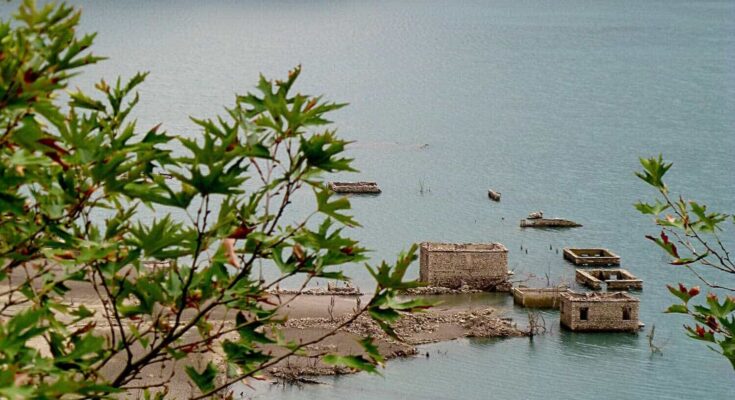The Athens metropolitan area is the latest area of Greece to be affected by water shortages, according to local sources.
The problem is due to prolonged high temperatures combined with a decrease in annual rainfall. These conditions have resulted in surface levels of Lake Mornos dropping. The artificial lake in Central Greece serves as a water reserve for the metropolitan area of Athens, the most populated part of the country.
Satellite images analyzed by the National Observatory of Athens show that the area of the lake covered by water—which was 16.6 sq. km. in July 2023—is currently just 12.8 sq. km.
During an investigation by Greek private broadcaster SKAI TV, scientists said water conservation measures will need to be adopted soon to help the area cope with reduced water availability. If surface levels continue to drop, it will soon be impossible to pump water, they caution.
A similar water supply crisis hit Athens in the early 1990s but was then resolved with the creation of another artificial lake which, in turn, supplied Lake Mornos with more water as needed.
Water shortage affecting several areas in Greece
Earlier this summer, a study conducted by the National Observatory of Athens and published in the scientific journal Atmospheric Research revealed shocking details about the water shortage problem in various areas of Greece.
Fourteen Greek municipalities have been placed under a state of emergency by the General Secretariat of Civil Protection. Among these are five municipalities on the island of Crete, as well as on Serifos, Sifnos, Leros, Poros, and Spetses. Moreover, the municipality of Sami on Kefalonia has also been affected, as have areas in Corinth, Alexandroupolis, and Xanthi.
On the islands, the solution is usually provided through the operation of desalination units, which often do not suffice to meet the continuously increasing needs, especially during the busy tourist season.
Besides the quality of life, water shortages could impact Greece’s agricultural production and crop quality.
Combined measures necessary for water resource management
In a recent interview with AMNA, Professor of Mountain Water Management Dimitris Emmanouloudis, who holds the UNESCO Chair on Management and Protection of Coastal and Deltaic Ecosystems, appeared positive that the implementation of a series of measures could efficiently address the challenges.
The proposed measures, according to Emmanouloudis, would range “from adopting a new culture of water conservation on an individual basis, to better irrigation techniques, avoiding water use for recreational and aesthetic reasons, restricting loss of water from networks and storage tanks (currently high at 45-55 percent) and more accurate assessment of the water footprint of areas, especially those with high levels of tourism, so as to build the appropriate small-scale infrastructure.”



